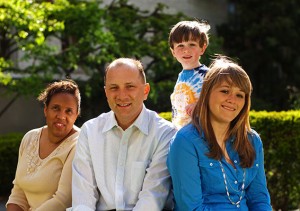Dana-Farber celebrates cancer survivorship in June with Living Proof, an annual series of events that includes workshops and programs as well as a keynote reception on June 20.
The end of treatment is an important milestone for any cancer patient, but it can also be a time of anxiety. In fact, some new cancer survivors say leaving the routine of regular visits with their health care team can be downright scary. That’s why Dana-Farber and other leading cancer centers offer programs to help survivors transition from active treatment to living well beyond cancer.
“Cancer survivors will tell you that the end of treatment doesn’t mean that everything automatically goes back to normal,” says Sarah Reed, MPH, LICSW, social worker in Dana-Farber’s Adult Survivorship Program. “These classes and support groups give you tools to deal with some of the unique stresses and challenges that can occur after treatment.”
 Dana-Farber offers a comprehensive series of survivorship classes and programs designed to help not just patients who are new to survivorship, but also those who have been cancer free for years.
Dana-Farber offers a comprehensive series of survivorship classes and programs designed to help not just patients who are new to survivorship, but also those who have been cancer free for years.
- What to Do When Survivorship Is New: This one-hour seminar invites patients who have recently completed treatment, and their friends and loved ones, to learn what to expect in the coming months and years.
- Survivorship Education Series: These 90-minute sessions, held monthly, give survivors a chance to meet and talk with a wide range of specialists, including nutritionists, doctors, cancer exercise experts, and practitioners in integrative therapies such as meditation and relaxation techniques.
- What Now? A Support Group for Adult Survivors: Held in six sessions, this group helps attendees sort through the common experiences and challenges of survivorship.
- Survivorship Reads: A monthly book club exploring topics and themes that may pop up after treatment. Participants can join the book club in-person at Dana-Farber’s Blum Patient and Family Resource Center or through a telephone conference call.
- Stress Management: This six-part class gives survivors and their loved ones tips for managing stress and coping with common concerns, such as fear of recurrence, difficulty sleeping, and appetite changes.
The classes and programs offered through Dana-Farber’s Adult Survivorship Program are open to all cancer survivors age 21 or older – regardless of where they were originally treated. To learn more, email dfci_adultsurvivors@dfci.harvard.edu or call 617‐632-4523.

Does Dana Farber have a support group for those of who will never be “done” with their treatment? Thanks in advance for your answer(s).